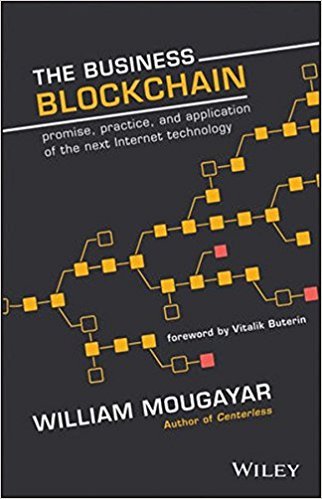
By: William Mougayar with a foreward by Vitalik Buterin
It is rare for me to get a book and read it one setting. Rarer it is to think a book so important that I am inspired to write a review. The last one that I remember was “Republic, Lost” by Lawrence Lessig.
Mougayar makes the bold statement that “blockchain will be the best new tool of the decade.” Imagine living in 1448, some eight years after the printing press was invented. How has our world evolved since then? His credentials are some fourteen years at Hewlett-Packard and over thirty years in the technology industry. A veritable technology geek (hanging with Vitalik Buterin before hardly anyone knew what was Ethereum), he breaks down blockchain technology into digestible bites (pun intended). Mougayar says we are just now at the stage of blockchain technology that the stage the internet was in around 1997.
Mougayar answers the question in the first chapter “What is the Blockchain?” Even a caveman lawyer can understand it. It is so exciting because it is a new protocol that sits on top of the internet similar to the architecture of the World Wide Web that sits on top of the internet. It is a trust layer, a database, a development platform, a network enabler, an exchange medium, secure pipes, a set of decentralized capabilities and even more! As Mougayar writes, “The blockchain has a strong narrative because it sparks our imagination.”
The blockchain is a meta technology because it affects other technologies. It involves software, game theory and cryptography. It is not anyone one thing, but rather many pieces working together and separately. The book explains things such as what is a “hash,” what are decentralized autonomous organizations (DAOs) and what are “smart contracts.” Think of it perhaps as essential reading in a college course on internet technology. Think of it also as a window into the future.
Running through the book I found several themes. One theme is to compare blockchain technology to the development of the internet with its challenges, blips and successes. Mougayar writes that we are entering the “decentralization era” and how the concept of trust is rapidly evolving to have the middleman be the network itself. Peer-to-peer exchange of value is the promise of bitcoin, but this is only the beginning after Satoshi Nakamoto’s whitepaper that emerged following the collapse of the big banks in 2009.
Other core themes are the ideas of decentralization and trust. And since it is a new technology, regulators are still unsure what to make of it. His prognosis is that ‘hopefully regulators can evolve with the new technology without a heavy handed approach (and thus allowing it to further develop), as long as users are not bad actors, pay their taxes, and do not conduct illegal activities.’
An entire chapter is devoted to financial services, showing how banks (old technology) adapted and reacted to startups in the fintech world. There is a tug and pull between innovators and the old guard of existing institutions and corporations. Think of Jaime Dimon of JPMorgan saying “anyone who buys bitcoin will be fired” as an example.
Another chapter is devoted to implementing blockchain technology in existing organizations. Think of it as a roadmap, perhaps a roadmap for survival for many institutions that will need to adapt to this new technology. I am excited to see how banks and governments will ultimately adopt the technology as their own.
Mougayar summarizes key ideas at the end of each chapter. He discusses the cryptoeconomy (and addresses the volatility of cryptocurrencies) and peers into the near future. He discusses the promise of the technology for the healthcare industry, government services and even energy. At its core, he writes that the promise of blockchain technology is not only problem solving (see my first post), but also a source of innovation and creativity.
Thus, for anyone in the fields of healthcare, government or banking I think this is essential reading. But also it is essential reading for people who want to be part of this new technology and the new sources of wealth that it will create. Like a good piece of art, the book raises more questions than it answers. The future will certainly be exciting. Mougayar’s website is here (http://thebusinessblockchain.com/synopsis/), where you can find links to purchase the book.